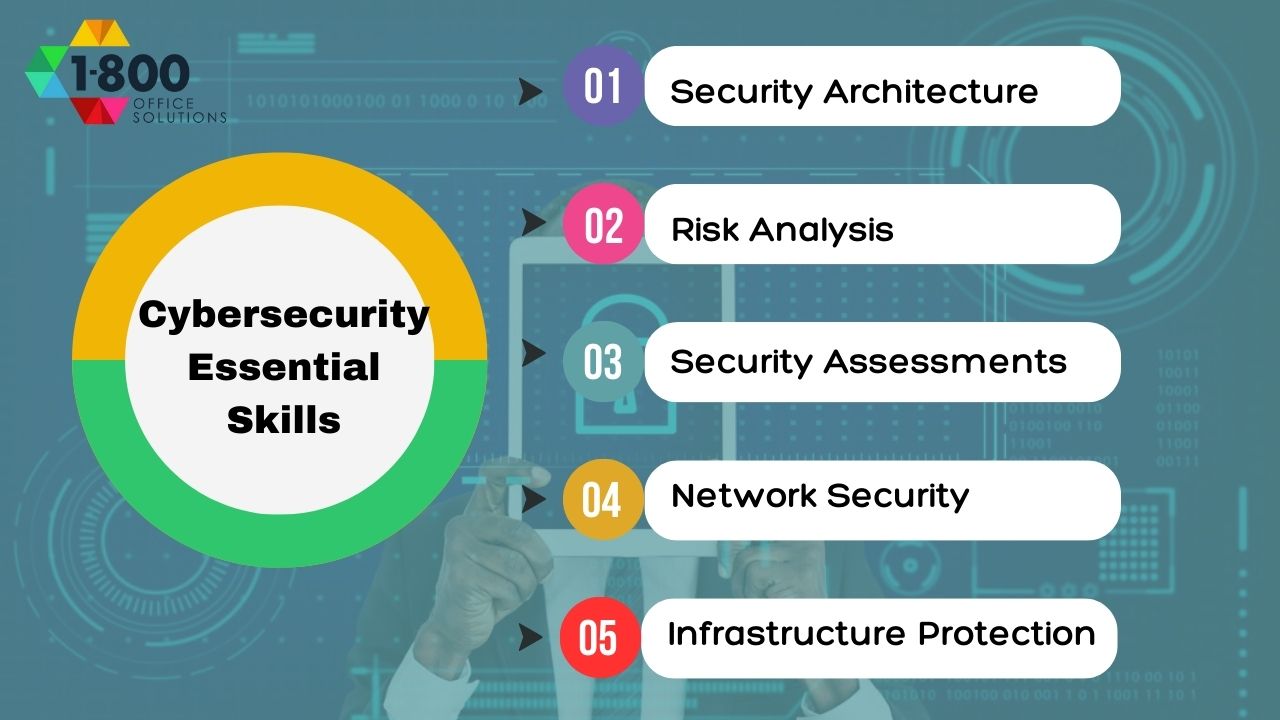Certified Cybersecurity Analyst: Trends and Predictions for the Future
Certified Cybersecurity Analyst
The Certified Cybersecurity Analyst is the professional of the future. This specialized role is vital in navigating the ever-changing world of cyber security, ensuring the protection of digital assets and sensitive data. As technology progresses and the digital landscape continues to evolve, the Certified Cybersecurity Analyst must stay ahead of the curve in order to provide the highest level of security for their organization.
The demand for cyber security professionals is growing rapidly, and the Certified Cybersecurity Analyst is needed more than ever to protect organizations from the increasing number of digital threats. With the emergence of new technologies, the need for an expert to interpret and implement the latest security protocols is paramount.
By combining the technical understanding of cyber security with the latest trends and predictions for the future, the Certified Cybersecurity Analyst will be the key to keeping organizations safe.

Overview of Certified Cybersecurity Analysts
A Certified Cybersecurity Analyst is a professional who is responsible for providing cyber security to an organization or individual. This includes identifying vulnerabilities, protecting against malicious attacks, and mitigating potential risks.
They have an extensive knowledge of information security practices and techniques, as well as the ability to implement them. They are also expected to have a certification in cybersecurity and/or security analyst, in order to provide the highest level of service.
In order to become a Certified Cybersecurity Analyst, one must possess a unique set of skills and knowledge.
Definition of a Certified Cybersecurity Analyst
Transitioning from the world of cybersecurity professionals, let’s delve into the specialized realm of Certified Cybersecurity Analysts. A Certified Cybersecurity Analyst is a professional with a unique set of skills and knowledge in the area of cybersecurity.
They are well-versed in analyzing and mitigating security threats and vulnerabilities related to information systems. They are also experts in identifying and responding to potential breaches in information security.
As a Certified Cybersecurity Analyst, a person needs to have a thorough understanding of the complexities of the cyber world. They need to be well-versed in a variety of methods and techniques for analyzing and effectively dealing with cyber threats. They should also have a deep knowledge of the tools and techniques used for detecting, analyzing, and responding to cyber-attacks.
In addition, a Certified Cybersecurity Analyst needs to have a strong background in technologies related to cybersecurity, such as network and systems security, cryptography, malware analysis, and information security. Furthermore, they should have a comprehensive understanding of the legal and regulatory standards associated with the field of cybersecurity.
Lastly, they should have a good grasp of the different types of vulnerability and be able to detect and respond to cyber threats in a timely and effective manner.
Skills and Knowledge Required for the Position
Moving on, to become a Certified Cybersecurity Analyst, certain skills and knowledge are essential. It is important to possess a comprehensive understanding of the cybersecurity landscape and all its components, such as vulnerability management, information security, and cyber threat detection.
A Certified Cybersecurity Analyst must also be well-versed in the relevant regulations and laws that govern the industry, such as the General Data Protection Regulation and the Health Insurance Portability and Accountability Act.
Moreover, Certified Cybersecurity Analysts should be well-versed in the various security analyst tools such as network analysis, malware analysis, and penetration testing. They must also have a deep understanding of cybersecurity governance, risk management, and compliance.
A Certified Cybersecurity Analyst should also have excellent problem-solving skills and the ability to come up with innovative solutions to complex issues.
In addition, a Certified Cybersecurity Analyst should have the ability to interpret data from different sources and present it in a cogent manner. They must also be capable of working in teams and coordinating with other members of the organization.
Career Prospects
Offering ample opportunities for those interested in pursuing a career in the rapidly growing field of cybersecurity, becoming a Certified Cybersecurity Analyst is an exciting and rewarding prospect. With the right training and qualifications, certified cybersecurity analysts can expect to find an abundance of job roles available to them, many of which offer excellent salaries and benefits.
From government agencies, finance, and healthcare, to retail, technology, and education, cybersecurity analyst certification is highly sought after in many fields. As the need for information security and cyber professionals continues to grow, so too do the job opportunities available to certified security analysts.
There are a variety of career paths available to those with a certification in cybersecurity, ranging from positions in management, engineering, and research, to vulnerability assessment, auditing, and consulting. In many cases, certified cybersecurity analysts are employed to identify and protect organizations from potential threats, develop innovative security solutions, and ensure compliance with relevant regulations.
Those with the right qualifications can expect to find themselves in demand, with excellent prospects for career advancement and a rewarding salary.
Current Trends in Cybersecurity
The world of cybersecurity is ever-evolving as new trends emerge. Recently, the focus has been on Cloud Security, Artificial Intelligence (AI) and Machine Learning, and Cybersecurity Legislation.
The CompTIA Cybersecurity Analyst (CSA+) certification is a great way to demonstrate proficiency in cloud security. CSA+ certified professionals are capable of implementing best practices and incident response strategies to protect cloud-based systems.

One of the most popular trends in cybersecurity is the use of AI and machine learning.
Cloud Security
As the digital landscape continues to rapidly expand, so too does the need for robust cybersecurity measures. Cloud security has become a major priority for businesses in recent years, with Comptia certifications providing an essential resource in understanding the latest best practices for cloud computing.
Cloud security involves a variety of measures designed to protect data stored and accessed online. It is important for businesses to understand the implications of their cloud computing environment and the associated risks that come with it. This includes understanding the type of data stored in the cloud and the potential threats from external sources.
Organizations must also be aware of the threat of penetration testing, which is the process of testing a system for vulnerabilities and weaknesses. Companies must also understand the need for incident response in the event of a security breach. Threat intelligence is also an important factor in cloud security, as it provides organizations with insight into potential threats and malicious activity.
Cloud security also requires a hands-on approach to ensure data is properly protected. This includes using strong passwords and two-factor authentication, as well as encrypting data both in transit and at rest.
Artificial Intelligence and Machine Learning
The introduction of Artificial Intelligence and Machine Learning into the field of cybersecurity is revolutionizing the way we identify and respond to cyber threats. This cutting-edge technology is transforming the way COMPTIA certified cybersecurity analysts protect sensitive data from malicious actors. With the help of AI and ML, analysts can quickly detect and analyze security threats and take incident response measures to protect data.
AI and ML offer hands-on solutions to cybersecurity professionals by reducing the burden of manual tasks, allowing them to focus on more complex issues. By leveraging predictive analytics, best practices and real-time threat intelligence, AI and ML are able to anticipate and respond to cyber threats faster than any human analyst. For example, AI-powered systems can identify suspicious activity and alert security teams in real time, enabling them to take immediate action.
The use of AI and ML for cybersecurity is growing rapidly, and many organizations are turning to these technologies to help them detect, investigate and respond to cyber threats. AI and ML-powered systems can also be used to conduct penetration tests and uncover previously undetected security vulnerabilities. This enables organizations to quickly detect and respond to threats before they can cause any damage.
Cybersecurity Legislation
The ever-evolving landscape of cybersecurity has necessitated stricter regulations to ensure the safety of data and systems. Cybersecurity legislation is finding its way into the legal framework of many countries and organizations, with the ultimate aim of safeguarding digital assets.
As the need for data protection increases, Comptia is one of the organizations at the forefront of introducing new cybersecurity legislation. With the help of network security professionals and incident response specialists, Comptia has established a comprehensive set of guidelines and best practices for ensuring the safety of user data. Some of these regulations include the development of an effective penetration test strategy, the implementation of threat intelligence measures, and the use of hands-on security measures.
The introduction of these laws marks the first step towards ensuring the safety of data and systems. The goal of these regulations is to create an environment where businesses, governments, and individuals can securely store, transmit, and manage data without the risk of compromise.
In addition to the introduction of new laws, Comptia is also pushing for more stringent enforcement of existing cybersecurity legislation. This includes the adoption of new technologies and best practices to ensure the safety of user data.
Predictions for the Future
As we look to the future, increased demand for Certified Cybersecurity Analysts is expected. With emerging technologies, the need for cybersecurity professionals is growing. These experts will need to possess the IBM Cybersecurity Analyst Professional Certificate to stay ahead of the ever-evolving cyber security landscape.

For those interested in a career in cybersecurity, they will need to be certified and knowledgeable in the latest security protocols and trends to be successful. At the same time, Information Security Analysts are becoming more important as they help manage and protect data from malicious attacks.
Increased Demand for Certified Cybersecurity Analysts
With the continually evolving threat landscape, the increased demand for Certified Cybersecurity Analysts is now more evident than ever before. As organizations face more advanced cyber-attacks, the need for qualified professionals to protect their data and systems has become paramount. With this increased demand, more certifications have become available to provide the necessary competencies and knowledge to pursue a career in cybersecurity.
The IBM Cybersecurity Analyst Professional Certificate is designed to help professionals understand the core concepts of cyber-attacks and prepare them to become certified cybersecurity professionals. This certification provides hands-on training in the identification, prevention, and response to cyber-attacks, as well as the implementation of effective controls and strategies.
The program is designed to help professionals develop the necessary skills and competencies to effectively manage a cyber security program and protect their organization from cyber-attacks.
In addition, the certification program also provides guidance on the different career paths in the cybersecurity field. From information security analysts to cybersecurity engineers, the program provides guidance on the various positions that are available and the skills and knowledge required to excel in the field. By understanding the different roles and responsibilities associated with each position, professionals can identify the best job opportunities for their skillset and experience.
Emerging Technologies and Cybersecurity
The increasing demand for certified cybersecurity analysts has highlighted the need for emerging technologies and cybersecurity to stay ahead of the ever-evolving cyber threats. The complexities of these technologies require skilled professionals with a strong understanding of the threats and solutions that are available in the market. As a result, there has been a surge in demand for qualified candidates with expertise in the field of cybersecurity.
IBM’s Cybersecurity Analyst Professional Certificate is one of the premier certifications available in the field of cybersecurity, and its credentials are highly sought after. The certificate program provides in-depth knowledge on topics such as cryptography, network security, data security, and risk management. It also provides hands-on training in the use of security tools and techniques, as well as an understanding of the principles of security operations.
Other certifications available in the field of cybersecurity include the Certified Information Systems Security Professional (CISSP), Certified Ethical Hacker (CEH), and CompTIA Security+. These certifications are designed to equip professionals with the skills and knowledge necessary to protect organizations from security threats and protect their data.
In addition to certifications, there are also career paths available for those looking to pursue a career in cybersecurity.
Cybersecurity as a Service
As the world of technology continues to expand, so too does the need for specialized security measures. Cybersecurity as a Service is becoming increasingly popular, offering businesses and organizations a way to access the latest in security protection. A career in cybersecurity can open up a variety of opportunities, with the demand for certified cybersecurity analysts continuing to grow.
A certification in the field of cybersecurity provides the necessary training and expertise to prepare those interested in taking on the challenge of protecting businesses from cyber threats.
IBM’s Cybersecurity Analyst Professional Certificate is one of the most sought-after qualifications for those looking to break into the cybersecurity industry. This certificate provides an in-depth understanding of the basics of cybersecurity, as well as the necessary skills to analyze and respond to cyber threats. With this certification, individuals can establish themselves as a cybersecurity professional, specializing in the prevention of malicious attacks and data breaches.
In addition to the traditional roles of a cybersecurity analyst, companies are also beginning to offer Cybersecurity as a Service, allowing businesses to have access to the latest security solutions without having to hire a full-time security specialist. Organizations can now access specialized experts who can provide the necessary advice and guidance to ensure their systems are secure.
Essential Skills for Certified Cybersecurity Analysts
Achieving a Certified Cybersecurity Analyst certification requires a comprehensive understanding of various topics, such as Security Architecture, Risk Analysis and Security Assessments, Network Security and Infrastructure Protection. To excel in the certification exam, aspiring analysts must develop expertise in designing secure systems, conducting risk assessments, and formulating security policies.
They must also be conversant with the fundamental principles of network security and infrastructure protection. Moreover, a strong knowledge of security operations center operations is essential for managing the security of corporate networks.

Security Architecture
The future of cybersecurity relies heavily on the competency of certified cybersecurity analysts and their ability to understand and implement security architecture. Taking the certification exam is the first step to becoming a certified cybersecurity analyst and mastering the skills necessary to succeed in a cybersecurity role.
The exam covers topics such as security architecture, risk analysis and security assessments, network security, and infrastructure protection.
Security architecture is the design of a secure network that is based on the unique requirements of the organization. It is the process of designing, creating, and managing an organization’s security system. The security architect must understand the organization’s infrastructure, its services, its technologies, and its users.
The security architecture must be tailored to the organization’s needs and be designed to protect its data and resources from unauthorized access. The security architect must also be familiar with the latest security trends and technologies, so they can properly design and implement security solutions.
Risk Analysis and Security Assessments
With the ever-changing landscape of cybersecurity, it is essential that certified cybersecurity analysts stay up-to-date on the latest risk analysis and security assessments to protect their networks and infrastructures. Risk analysis and security assessments are a critical component of any successful security operations center and are essential skills for a qualified cybersecurity analyst.
The first step in the risk analysis and security assessment process is the security architecture. It is the blueprint for protecting the physical and virtual assets of a company and is one of the most important functions of a cybersecurity analyst. This architecture includes the analysis of the security environment, the development of secure systems and the implementation of security policies.
Once the security architecture is in place, the certified cybersecurity analyst must then consider the threats and vulnerabilities associated with the system and devise a mitigation strategy. The analyst must be able to identify and assess any potential risks and develop a strategy to mitigate them. This includes conducting vulnerability scans, penetration testing and other security assessments.
After the mitigation strategy has been created, the certified cybersecurity analyst must then implement the security strategy. This includes the deployment of network security measures such as firewalls, intrusion detection systems, antivirus software and other protective measures.
Network Security and Infrastructure Protection
With the constantly changing cyber landscape, it is vital that Certified Cybersecurity Analysts have a strong foundation in Network Security and Infrastructure Protection in order to protect organizational assets. To be successful in this cybersecurity role, analysts must possess strong technical skills, such as the ability to install, configure, and troubleshoot various security components, as well as understand how the components interact with one another.
It is also important for a Certified Cybersecurity Analyst to have a deep understanding of security architecture and risk analysis. This includes knowing the best practices for designing and implementing secure networks, as well as understanding how to identify and mitigate potential risks. Furthermore, the analyst should have the skills needed to perform security assessments, such as penetration testing, vulnerability scanning, and incident response.
To stand out from the competition, Certified Cybersecurity Analysts should also have a strong knowledge of network security and infrastructure protection. This includes knowing how to configure firewalls, implement secure authentication protocols, and deploy intrusion detection/prevention systems. Additionally, analysts should have experience working in a Security Operations Center and understand how to monitor, investigate, and respond to security incidents.
Job Prospects for Certified Cybersecurity Analysts
Job prospects for Certified Cybersecurity Analysts are excellent due to the high demand for individuals with the knowledge and skills to protect organizations from the increasing number of cyber threats.

Individuals must possess a deep understanding of cybersecurity concepts, application security, system security, information systems, and information assurance to become a Certified Cybersecurity Analyst. Professionals must complete a Certified Cyber Security Analyst Course to earn a Shareable Certificate.
Job Opportunities in the Public and Private Sectors
With the foundation of essential skills for a Certified Cybersecurity Analyst in hand, let’s explore the job prospects in the public and private sectors for these professionals.
The demand for experienced and knowledgeable cybersecurity professionals has grown exponentially over the past decade. Organizations in both the public and private sectors are looking for individuals who can identify, mitigate, and prevent cyber threats. A Certified Cybersecurity Analyst is a great choice for those seeking to make a career in the field.
Job opportunities in the public sector include positions at the federal government, state, and local governments. These roles could include working with the Department of Defense, Homeland Security, and other government agencies. These professionals are tasked with protecting government systems from cyber intrusions or attacks.
In the private sector, Certified Cybersecurity Analysts can find job opportunities in a variety of industries, from finance to retail to healthcare. These roles can include developing security policies and protocols, monitoring systems and networks for suspicious activity, and responding to security incidents.
While the specific requirements to take the Certified Cybersecurity Analyst exam vary by organization, most employers require at least two years of IT experience and a certification in cybersecurity.
Salaries and Other Benefits
The prospects for a Certified Cybersecurity Analyst look quite promising. Salaries and other benefits are impressive for those who have received the certification and have the right cybersecurity skills. According to the Bureau of Labor Statistics, the median salary for a Cybersecurity Analyst is $98,350. Additionally, there are bonuses, stock options, and other benefits available for those in the cybersecurity field.
For those who have earned their Analyst Professional Certificate Program, some companies offer additional certifications such as Certified Ethical Hacker and Global Information Assurance Certification. These certifications can help to improve the salary and other benefits of a Cybersecurity Analyst.
Those who receive a Shareable Certificate from a Certified Cyber Security Analyst Course may also receive higher salaries and greater benefits than those with an entry-level role as a cybersecurity analyst. The Certified Cyber Security Analyst Course provides knowledge and skills in topics important in today’s cybersecurity landscape such as cyber threats, information assurance, security analysis, application security, and system security.
Career Advancement Opportunities
Having the essential skills for a Certified Cybersecurity Analyst is a great start, but what about the job prospects this career offers? Everyone wants to know what the potential salaries and other benefits are, what kind of career advancement opportunities there are, and what kind of job opportunities exist in both the public and private sectors. Let’s take a look at career advancement opportunities in the field of cybersecurity.
One way to advance in the cybersecurity field is to obtain certification in cybersecurity. There are many certifications available, including the Certified Cyber Security Analyst Professional Certificate Program. This program focuses on understanding the fundamentals of cybersecurity, including topics important in today’s cybersecurity landscape such as application security, system security, cyber threats, information assurance, and information systems.
You’ll also gain knowledge of cybersecurity analyst tools, such as data protection, ethical hacker, security analysis, and cybersecurity engineer. After successfully passing the exam, you will receive a shareable certificate of completion.
Another way to advance your cybersecurity skills is to join the National Initiative for Cybersecurity Education (NICE).
Professional Development for Certified Cybersecurity Analysts
Continuing education opportunities, certification programs, and professional networking are essential elements of professional development for Certified Cybersecurity Analysts. Various cybersecurity topics are covered, such as application security, system security, data protection, and cyber threats.

Continuing Education Opportunities
Stepping away from job prospects for Certified Cybersecurity Analysts, let’s now take a look at continuing education opportunities in the field. For those looking to further develop their cybersecurity skills and become a Certified Cybersecurity Analyst, there are several certification programs that can help them reach their goal.
Certification programs such as the Certified Cyber Security Analyst course offered by Security University provides specific requirements that need to be met in order to take the certification exam and become a certified analyst, as well as exam prep materials. The course also provides a comprehensive understanding of key cybersecurity concepts, cybersecurity analyst tools including data protection and security solutions, as well as key compliance and threat intelligence topics important in today’s cybersecurity landscape.
The Comptia Security+ certification is also a great way for aspiring analysts to gain the knowledge and skills needed to become a successful analyst. This certification provides a shareable certificate, which allows individuals to demonstrate their knowledge and ability to respond to security incidents, as well as their knowledge of cybersecurity analyst tools.
Certification Programs
Continuing on from the discussion of job prospects for Certified Cybersecurity Analysts, it is important to also consider the various professional development opportunities available to those in the field. One of the primary opportunities available is certification programs. A certification program is an assessment process that tests one’s knowledge, skills, and abilities related to certain information security topics.
Certification programs can provide professionals with the opportunity to demonstrate their understanding of cybersecurity concepts, information systems, cyber threats, and other topics important in today’s cybersecurity landscape.
The analyst professional certificate program is a popular choice, as it covers the key cybersecurity analyst tools including data protection, security analysis, and information assurance. The Certified Cyber Security Analyst course provides an entry-level role as a cybersecurity analyst, with knowledge and skills related to the security solutions and security tasks for responding to security incidents.
The Comptia Security+ certification is another popular choice, as it covers the fundamentals of information security management, security principles, and systems and network fundamentals.
Professional Networking
To further develop their professional career as a Certified Cybersecurity Analyst, networking plays a vital role. By engaging in professional networking, Certified Cybersecurity Analysts can build relationships with employers, peers, and other professionals to stay up to date with the latest cybersecurity trends and gain access to job opportunities.
Additionally, networking can help Certified Cybersecurity Analysts gain a better understanding of cybersecurity concepts and access to cybersecurity analyst tools, such as data protection, security certification, and information assurance. Furthermore, by networking, Certified Cybersecurity Analysts can gain access to cybersecurity jobs and cyber threats intelligence topics important in today’s cybersecurity landscape.
Furthermore, networking helps Certified Cybersecurity Analysts obtain certification in cybersecurity. For example, a comptia security certification, the national initiative for cybersecurity certification, or the certified ethical hacker certification. These certifications provide the knowledge and skills required to become a cybersecurity engineer or an entry-level role as a cybersecurity analyst.
Impact of Automation on the Field
The field of cybersecurity has seen tremendous growth in recent years, due to the increasing need for application security, system security and cyber threats. Automation and machine learning have become integral components of the cybersecurity landscape, providing benefits to certified cybersecurity analysts such as improved security analysis, increased information assurance and an overall understanding of cybersecurity.

Automation and Machine Learning in Cybersecurity
Transitioning from the previous section, it is clear that Automation and Machine Learning are important topics in the field of Cybersecurity. Automation and Machine Learning are being used in the Cybersecurity field to enable certified cybersecurity analysts to complete more complex and tedious security tasks with greater accuracy and efficiency. With the emergence of these technologies, today’s analyst must be knowledgeable in this domain to be successful in the field.
Automation and Machine Learning in Cybersecurity can have a tremendous impact on the field. Automation can assist certified cybersecurity analysts in their security tasks by automating tasks such as data analysis, malware analysis, security compliance, and vulnerability assessment.
This can help analysts to quickly identify and respond to security incidents, as well as identify potential areas of risk. Additionally, Machine Learning can be used to analyze large amounts of data to detect patterns and trends, which can help analysts identify potential cyber threats.
The Benefits of Automation for Certified Cybersecurity Analysts are numerous. Automation can help analysts to quickly identify and respond to security incidents, reducing the time and effort needed to complete security tasks. Additionally, automation can help to reduce the risk of human error in the security processes.
Benefits of Automation for Certified Cybersecurity Analysts
The potential impact of automation on the field of cybersecurity has been an area of discussion for many years, and its importance cannot be understated. As automation and machine learning continue to advance, certified cybersecurity analysts can benefit from a more efficient and secure system, and access to an ever-growing range of cybersecurity skills and cybersecurity analyst tools.
For the certified cybersecurity analyst, automation can provide a number of benefits. Automation can help reduce the time spent on security analysis, freeing up more time to focus on other topics important in today’s cybersecurity landscape, such as cyber threats, information assurance, and knowledge and skills.
Automation can also help with the understanding of cybersecurity, as it provides a more efficient way to learn and apply cybersecurity concepts, cybersecurity engineer, and cybersecurity jobs.
Furthermore, automation can help certified cybersecurity analysts acquire the knowledge of cybersecurity analyst tools needed for the job, including data protection and information systems.
Challenges of Automation
Moving on from the professional development opportunities for Certified Cybersecurity Analysts, let’s discuss the impact of automation on the field. Automation and machine learning are increasingly being used to help identify and respond to cyber threats, and analysts must understand the benefits and challenges of these tools.
One of the major challenges of automation is that it can eliminate the need for cybersecurity skills and cybersecurity jobs. Automation can free up time for analysts to focus on more complex tasks, but it also has the potential to reduce demand for cybersecurity employees. Furthermore, automation tools can be expensive to purchase and maintain, meaning that some organizations may not be able to benefit from them.
Additionally, automation tools can fail, leading to potential security risks. For instance, a tool that fails to identify a cyber threat can cause significant damage to an organization. Furthermore, as the tools become more complex, the potential for security vulnerabilities increases, and analysts must be able to respond to such incidents.
The Future of the Field
The future of the field of Cybersecurity is bright, with a growing need for professionals who can understand the intricate application security system, cybersecurity skills, and cybersecurity analyst tools. As a Cybersecurity Engineer or Analyst, one must be well-versed in cybersecurity concepts, security analysis, information systems, as well as understanding of cybersecurity.

The Growing Need for Cybersecurity Professionals
As automation continues to transform the field of cybersecurity, one thing is becoming increasingly clear: there is a growing need for cybersecurity professionals. From applications security and system security to understanding key cybersecurity concepts, the need for skilled personnel to carry out these duties is necessary. This means that those interested in the field should have knowledge and skills related to 10 cybersecurity domains, cybersecurity skills, and cybersecurity analyst tools, including data protection and security analysis.
In order to become a cybersecurity analyst, one must typically have an understanding of cybersecurity, an entry-level role as a cybersecurity analyst, and knowledge of cybersecurity analyst tools. Those interested in advancing in the field may want to pursue a Certified Cybersecurity Analyst Professional Certificate Program, which will give them the skills necessary to become a certified ethical hacker or cybersecurity engineer.
The National Initiative for Cybersecurity Education (NICE) initiative provides a Shareable Certificate, which is a nationally recognized certification.
The Impact of Technology on the Role of Cybersecurity Analysts
The ever-evolving world of technology is driving the need for a highly skilled and knowledgeable cybersecurity analyst. As new technologies emerge, the demand for cybersecurity professionals with the knowledge and skills to respond to security incidents increases exponentially.
An entry-level role as a cybersecurity analyst requires a deep understanding of cybersecurity concepts and cybersecurity analyst tools, including data protection, system security, application security, and cybersecurity skills. These skills must include knowledge of cybersecurity analyst tools, including data protection, system security, application security, and cybersecurity skills.
The growing need for cybersecurity professionals, along with the expansion of technology, has led to the development of several cybersecurity certifications. Companies and organizations are hiring cybersecurity professionals with the skills and experience to effectively respond to security incidents as well as understand the cybersecurity landscape.
The CompTIA Security+ certification is a popular entry-level cybersecurity certification, as it covers the ten cybersecurity domains deemed important in today’s cybersecurity landscape.
The Future of Cybersecurity Regulations
As automation continues to revolutionize the field of cybersecurity, the focus must shift to the future of cybersecurity regulations. As the nature of cyber threats evolves and the demand for cybersecurity professionals grows, the role of the cybersecurity analyst must adapt to the changing landscape.
This requires a deep understanding of the key cybersecurity concepts, knowledge of cybersecurity analyst tools, and topics important in today’s cybersecurity landscape, such as intelligence topics important in today’s information assurance.
Certified Cyber Security Analyst Course is a shareable certificate that provides the foundational knowledge and skills necessary for an entry-level role as a cybersecurity analyst. The certification covers the key compliance and threat intelligence topics important in today’s cybersecurity landscape, as well as knowledge and skills to become a cybersecurity analyst.
This includes topics such as application security, system security, cyber threats, and security analysis. The course also covers the important ethical hacker and security solutions that are necessary to respond to security incidents.
In order to take the Certified Cyber Security Analyst Course, there are specific requirements. This includes two years of IT experience and passing the exam.
Conclusion
The Certified Cybersecurity Analyst field is set to rapidly expand in the coming years as businesses of all sizes look to protect their networks and data from attacks. Cybersecurity analysts must possess a unique combination of skills, including technical knowledge, problem-solving abilities, and a willingness to stay up-to-date with the latest technology trends.
While automation will continue to play a role in the field, skilled professionals will remain in high demand for the foreseeable future. With some dedicated effort and the right certifications, anyone can make a successful career in the Certified Cybersecurity Analyst field.











